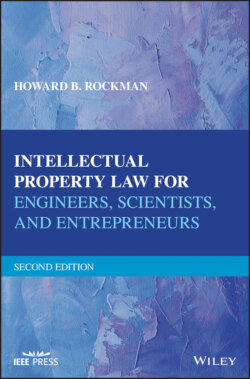Читать книгу Intellectual Property Law for Engineers, Scientists, and Entrepreneurs - Howard B. Rockman - Страница 86
5.3 ADDITIONAL COMMENTS ON EXPERIMENTAL USE VERSUS ACTUAL USE OF THE INVENTION
ОглавлениеIf for reasons that are beyond your control, such as a lack of financing, or the fact that a budget for introduction for new products for a given year has already been expended, you find yourself in a situation where your invention, or certain aspects of your invention, may have been exposed to third parties more than a year before your patent application filing date without being covered by a Confidential Non‐Disclosure Agreement, consideration must be given to inquiring whether such use can be established as experimental use and not public use by revisiting the facts surrounding such disclosure. One major consideration is whether or not the disclosure to third parties involved a disclosure of a complete, workable invention, or whether or not development work was still being conducted on the invention, and additional work on the invention took place after such disclosure. A disclosure that will defeat the validity of a patent must be a disclosure of the complete invention. Disclosures to third parties such as vendors or potential marketing partners more than a year before the patent application was filed may be held to be “experimental uses” if it can be shown that development work continued from the point of that disclosure forward to perfect and modify the invention, and the invention was not technically complete and should not be considered an “invention” upon the date of disclosure. Any significant changes to your invention made after such disclosure tend to prove that the disclosure was made only of the experimental model, and not the completed invention. Also, public uses of the invention for technical test purposes are usually considered as experimental uses, while on the other hand, market testing of the complete or near‐complete invention are considered as public uses, and not experimental uses.
To avoid any possibility of creating “public information” that may affect the validity of the patent adversely, I suggest that as soon as you have determined that the project you are working on may lead to a patentable invention, and before there is any public disclosure of the invention outside the realm of the inventors or the company for or with whom you may be working, consideration be given to patenting your invention, and that you gain information from a patent professional as to what disclosure of the invention can or cannot be made, and how “confidential” disclosures can be made that will not affect patent rights. This will avoid issues adverse to patentability from arising in the first place.
